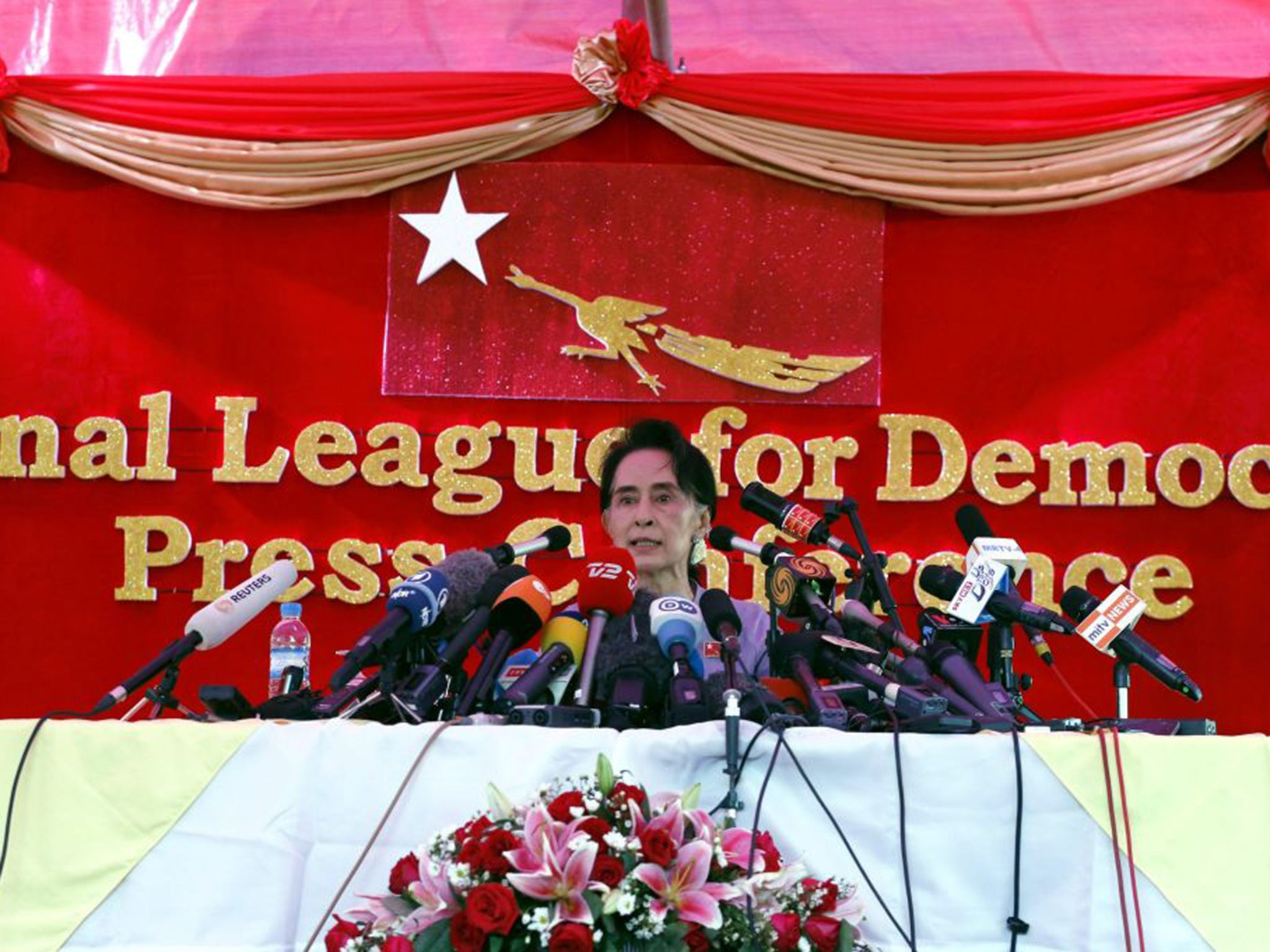Burma election: Aung Sang Suu Kyi says she could rule 'above the president'
In the past five years the country has emerged from decades of military rule

Aung San Suu Kyi has declared that she would occupy a position “above the president” if her party wins this weekend’s elections and dismissed the constitutional block on her taking power as a “minor obstacle”.
In a steely, bravura performance before the world’s press in the garden of her family home on Rangoon’s Inya Lake, she silenced at a stroke those critics who have complained at the lack of access to the Burmese opposition leader, and threw up a new challenge to the generals who have run Burma for the past 50 years.
Ms Suu Kyi faces a conundrum. She is much the most popular politician in Burma. Likewise her National League for Democracy (NLD) is the runaway favourite to win, so long as the Union Election Commission – headed by a former general – plays fair. But even if she won every seat in the country, she has no chance of fulfilling her ambition to become Burma’s ruler. In a clause that no one doubts was inserted deliberately to thwart her, she cannot become president because her two sons are not Burmese citizens.
But she has revealed her solution. In an interview with an Indian television channel recently she had said that, if her party wins, she intends to rule, no matter what. If she were not the president, a journalist suggested, wouldn’t it be unconstitutional to rule? She retorted: “The constitution says nothing about someone being above the president.”
When someone suggested she might become prime minister – though under Burma’s constitution there is no such role – she shot back: “Who said I’m going to be prime minister? I’ve already said I’m going to be above the president – I’ve already made plans.”
And in a final blow at those maundering on about the constitution, she said: “I don’t see why we shouldn’t be able to overcome minor obstacles like the constitution.” Was that some kind of joke? Had she, a Burmese colleague suggested, perhaps gone mad?
The plan is as follows. If the NLD were to win an overwhelming majority – and it needs at least 67 per cent of seats for a simple majority, as one quarter of seats in Parliament are reserved for serving soldiers, who will oppose it – it would have a fighting chance of getting its candidate into the job of president, the person who picks the cabinet and runs the country.
That could not be Ms Suu Kyi – but she would choose a willing puppet to occupy the top chair, and she would be the puppeteer. A Burmese editor told me she had already picked the person, though the identity is a secret: a man aged about 60, who is not yet a member of the NLD.
Whatever happens on Sunday, ultimate power will continue to be held by the head of the army, who has the right to declare martial law at will – so the question is whether he would stand for it. The rumour mill says that he, General Min Aung Hlaing, who has high political ambitions of his own, is most unhappy about the idea. Of course we are not there yet: it may never happen. “To begin with,” she said, “at the start of the campaign, people seemed not to be too interested in the election, but as we proceeded with our voter education we found that people were taking an increasing interest… We have been very encouraged by the enthusiasm of people about being part of the electoral process.
“We have however been very concerned about the lack of enthusiasm on the part of the UEC [Union Election Commission] to ensure free and fair elections.”
Complaints include voter lists padded with phantom voters, to allow for last-minute ballot box-stuffing, and the sort of mass advance voting which gave the ruling Union Solidarity and Development Party – a proxy for the army – a landslide majority in 2010’s election.
But in 2010 Burma was a very different country. Ms Suu Kyi dismissed the changes wrought by President Thein Sein – briefly her ally – since his election in 2011 as “a veneer”. That was a little unfair: five years ago she was under house arrest, the media endured draconian censorship, the jails were full of political prisoners. Today, she maintained: “The great majority of people have not become better off, and some especially in rural areas have become poorer since the lifting of sanctions.” But, at least in the cities, the fear that pervaded through the decades of military rule has been thrown off.
One glaring exception is the Muslim Rohingyas in Arakan state, whose suffering today is far worse. Asked whether she considered their treatment to be genocide, Ms Suu Kyi said: “I think it’s very important that we should not exaggerate the problems in this country… Remember the Burmese saying: you have to make big problems small, and small problems disappear.”
But perhaps the Burmese will at last have the opportunity – after 25 years trying – to put Ms Suu Kyi and her party into power. If so, they would not be disappointed, she promised. “Of course the NLD has sufficient talent to lead a good government… It can’t be worse than what we have already.”
But are they ready for a queenly figure who is planning to rule them above and beyond constitutional limits? That may be a different matter.
Join our commenting forum
Join thought-provoking conversations, follow other Independent readers and see their replies
Comments
Bookmark popover
Removed from bookmarks